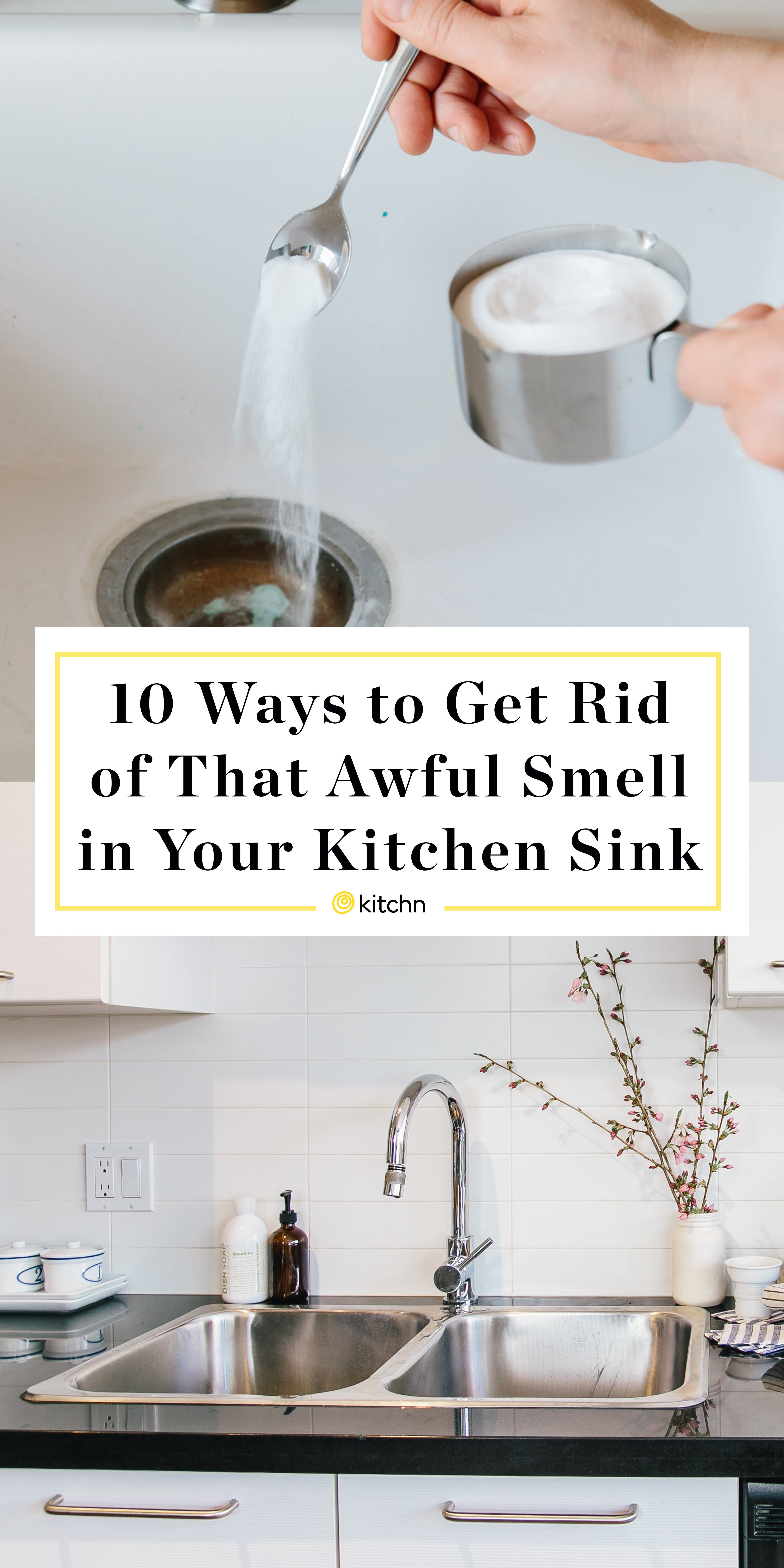Do you have a foul kitchen drain smell lingering in your home? The answer is often due to trapped food particles, grease buildup, or bacterial growth within your drainpipe or garbage disposal. This article will explore the most common kitchen sink odor causes and provide effective smelly drain solutions to restore freshness to your kitchen.

Image Source: cdn.apartmenttherapy.info
Deciphering the Mystery Behind the Kitchen Drain Smell
A stinky kitchen drain is a common household problem, but why does it happen? Several factors contribute to that unpleasant odor wafting up from your sink. Let’s investigate the usual suspects.
Food Debris: The Prime Culprit
Tiny bits of food go down the drain daily, even with the most diligent rinsing. These scraps accumulate inside the drainpipe, where they decompose and breed bacteria. This rotting food creates a breeding ground for unpleasant odors.
Grease Buildup: A Sticky Situation
Grease, fats, and oils are a major cause of smelly drains. Hot grease might seem harmless when poured down the drain, but as it cools, it solidifies. This sticky substance clings to the drain walls, trapping food particles and creating a nasty, smelly clog.
Biofilm Formation: A Microbial Menace
Biofilm in kitchen drain pipes is a slimy layer of bacteria and organic matter that adheres to the inner surfaces. This kitchen drain bacteria smell can be quite pungent and resistant to simple flushing. Biofilm thrives in the dark, damp environment of a drainpipe, continuously releasing foul odors.
Dry P-Trap: An Open Sewer Line
The P-trap is a U-shaped section of pipe located under your sink. It’s designed to hold water, creating a seal that prevents sewer gases from entering your home. If the P-trap dries out (due to infrequent use or evaporation), those gases can escape, leading to a nasty smell.
Garbage Disposal Issues: A Grinding Problem
Your garbage disposal odor can arise from several sources. Food particles can get trapped under the rubber splash guard or between the blades, leading to decay. Also, a dull blade cannot grind properly, further accelerating the accumulation of rotting material.
Kitchen Drain Plumbing Issues: Beyond the Surface
While most drain odors are due to simple buildup, sometimes kitchen drain plumbing issues contribute to the problem. A blocked vent pipe, for instance, can prevent proper airflow in the drain system, causing odors to back up into the house. Similarly, a cracked or leaking drainpipe can create a hidden breeding ground for mold and bacteria.
Smelly Drain Solutions: Quick Fixes and Long-Term Strategies
Now that we’ve identified the common causes, let’s explore some smelly drain solutions to get rid of that foul kitchen drain smell.
Hot Water Flush: A Simple Start
A simple, but often effective, first step is flushing the drain with hot water.
- How to: Run the hottest water from your faucet down the drain for several minutes.
- Why it works: Hot water helps to dislodge loose debris and melt away some grease buildup.
- When to use: As a daily or weekly maintenance step to prevent odors.
Baking Soda and Vinegar: A Dynamic Duo
This classic combination creates a natural chemical reaction that can break down organic matter and neutralize odors. This is a safe and effective kitchen drain smell remedy.
- How to: Pour one cup of baking soda down the drain, followed by one cup of white vinegar. Let it fizz for 30 minutes, then flush with hot water.
- Why it works: The baking soda helps to scrub the drain walls, while the vinegar reacts with the baking soda to create a bubbling action that dislodges debris.
- When to use: Once a week or as needed for odor control.
Boiling Water: A Powerful Degreaser
Boiling water is an effective and eco-friendly way to melt away grease and clear minor clogs.
- How to: Carefully pour a kettle of boiling water down the drain.
- Why it works: The extreme heat melts grease and dislodges accumulated debris.
- When to use: Every few weeks to prevent grease buildup.
- Caution: Avoid using boiling water on PVC pipes, as it can soften or damage them. Consider using very hot tap water instead.
Enzyme Cleaners: A Biological Solution
Enzyme cleaners contain beneficial bacteria that break down organic waste and eliminate odors.
- How to: Follow the instructions on the product label. Typically, you pour the cleaner down the drain and let it sit overnight.
- Why it works: The enzymes digest the organic matter, eliminating the source of the odor.
- When to use: Monthly or as needed for persistent odors.
Cleaning the Garbage Disposal: Eliminating the Source
If the odor seems to be coming from the garbage disposal, it’s time for a thorough cleaning.
Step-by-step Garbage Disposal Cleaning
- Unplug the disposal: Always disconnect the power before cleaning to prevent accidents.
- Remove large debris: Use tongs to remove any large food particles or foreign objects.
- Ice and salt: Drop a cup of ice cubes and a half-cup of rock salt into the disposal. Run cold water and turn on the disposal for a minute or two. The ice and salt will help to scrub the blades.
- Citrus peels: Grind citrus peels (lemon, lime, or orange) in the disposal to freshen the scent.
- Baking soda and vinegar: Pour a mixture of baking soda and vinegar down the drain, let it fizz for 30 minutes, and then flush with hot water.
- Clean the splash guard: Remove the rubber splash guard and scrub it with soap and water to remove any trapped food particles.
- Flush: Run water for 30-60 seconds.
Troubleshooting Garbage Disposal Smells
| Problem | Possible Cause | Solution |
|---|---|---|
| Persistent foul odor | Trapped food particles | Thoroughly clean the disposal with ice, salt, and citrus peels. |
| Grinding inefficiency | Dull blades | Sharpen blades by grinding ice or replace the disposal if necessary. |
| Slow draining | Clog in the drainpipe | Use a plunger or drain snake to clear the clog. |
| Foul odor from splash guard | Bacteria buildup | Remove the splash guard and scrub it with soap and water. |
Drain Snake or Plunger: Clearing the Blockage
If the above methods don’t work, you may have a clog deeper in the drainpipe that requires mechanical removal.
- Drain snake: Insert the drain snake into the drain and rotate it to break up and remove the clog.
- Plunger: Use a plunger to create suction and dislodge the clog.
Professional Help: When to Call a Plumber
If you’ve tried all the DIY methods and the drain odor persists, it’s time to call a professional plumber. There may be a more serious plumbing issue, such as a blocked vent pipe, a cracked drainpipe, or a problem with the sewer line.
Preventing Kitchen Drain Smells: Long-Term Strategies
Preventing kitchen drain smells is easier than dealing with them. Here are some habits to adopt to keep your drain fresh.
Be Mindful of What Goes Down the Drain
Avoid pouring grease, fats, and oils down the drain. Dispose of them in a separate container. Scrape food scraps into the trash or compost bin before washing dishes.
Run Water After Each Use
After washing dishes or using the garbage disposal, run water for at least 30 seconds to flush away any remaining debris.
Regular Cleaning and Maintenance
- Flush with hot water: Run hot water down the drain for a few minutes every week to prevent grease buildup.
- Baking soda and vinegar: Use the baking soda and vinegar treatment monthly to keep the drain clean and fresh.
- Garbage disposal cleaning: Clean the garbage disposal regularly, following the steps outlined above.
- Enzyme cleaner: Treat the drain with an enzyme cleaner monthly to break down organic waste.
Check the P-Trap Regularly
If you haven’t used a sink for a while, run some water to refill the P-trap and prevent sewer gases from escaping.
Consider Drain Strainers
Install drain strainers in your kitchen sinks to catch food particles and prevent them from going down the drain. Clean the strainers regularly to prevent buildup.
Proper Ventilation
Ensure your plumbing system has adequate ventilation. Blocked vent pipes can cause negative pressure, pulling sewer gases back into your home.
Fathoming Biofilm
As mentioned previously, biofilm can cause a potent smell. Here are some additional tips to specifically target it:
- Specialized Cleaners: There are drain cleaners formulated specifically to dissolve biofilm. These often contain enzymes or oxidizing agents.
- Scrubbing: While difficult to reach, physically scrubbing the drain opening and the splash guard of the garbage disposal can help remove some of the biofilm accumulation.
- Prevention: Regular flushing with hot water and the use of enzyme cleaners can help prevent biofilm from forming in the first place.
Interpreting the Connection Between Drain Odor and Health
While a smelly drain is primarily a nuisance, it can sometimes indicate underlying health or safety issues. The sewer gases that escape from a dry P-trap, for instance, can contain methane, hydrogen sulfide, and ammonia, which can be harmful if inhaled in large quantities. Also, the presence of mold and bacteria in a damp drainpipe can contribute to allergies and respiratory problems.
If you notice any of the following symptoms, consult a doctor or plumber:
- Persistent headaches
- Nausea
- Dizziness
- Respiratory irritation
- Water damage around the sink or drainpipe
Frequently Asked Questions (FAQ)
What is that horrible smell coming from my kitchen drain?
The most common cause is decaying food particles, grease buildup, or bacterial growth in your drainpipe or garbage disposal. A dry P-trap can also allow sewer gases to escape, creating a foul odor.
Can I use bleach to clean my smelly drain?
While bleach may kill some bacteria, it’s not recommended for regular drain cleaning. Bleach can damage pipes, corrode metal, and create harmful fumes when mixed with other chemicals. Stick to safer alternatives like baking soda and vinegar or enzyme cleaners.
Who is responsible for fixing a smelly drain in a rental property?
Typically, the landlord is responsible for maintaining the plumbing system in a rental property. However, if the drain odor is due to tenant negligence (e.g., pouring grease down the drain), the tenant may be responsible for the repair costs. Refer to your lease agreement for specific terms.
What if the drain smell comes and goes?
Intermittent drain smells are often caused by infrequent use of the sink, allowing the P-trap to dry out. Run water regularly to keep the P-trap filled. Temperature fluctuations can also affect drain odors, as warmer temperatures promote bacterial growth.
Why does my kitchen drain smell like rotten eggs?
A rotten egg smell is usually a sign of sewer gas escaping from the drain. This can be caused by a dry P-trap, a blocked vent pipe, or a leak in the sewer line. Call a plumber to investigate and repair the problem.
Can I prevent drain smells by using a drain cleaner regularly?
While drain cleaners can help to clear clogs and eliminate odors, using harsh chemical drain cleaners too often can damage your pipes. It’s best to use natural alternatives like baking soda and vinegar or enzyme cleaners for regular maintenance. If you have a persistent clog, consider calling a plumber to avoid damaging your pipes.

Hi, I’m Larry Fish, the mind behind MyGrinderGuide.com.. With a passion for all things kitchen appliances, I created this blog to share my hands-on experience and expert knowledge. Whether it’s helping you choose the right tools for your culinary adventures or offering tips to make your kitchen more efficient, I’m here to guide you. My goal is to make your time in the kitchen not only easier but also enjoyable! Welcome to my world of kitchen mastery!
